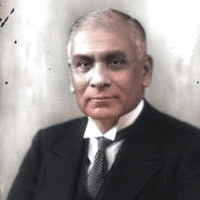National Liberation Federation was a party of those Liberals that formed a small minority in public life as well as in the legislatures. But it included some men of great experience and capabilities like Sir Tej Bahadur Sapru, Sir Chimanlal H. Setalved and Sir Srinavasa Sastri. In the annual session of December 1940 at Calcutta the Liberals laid down their principle of policy, which they thought could show a way out of the impasse. The main points were: the war effort should be supported, Britain should immediately declare that India would be a Dominion within two years after the war, the Central Government should be reconstituted, partition should be ruled out and the communal electorates should be eliminated gradually and the Congress civil disobedience movement was not effective.
The Liberals called a ‘non-party conference’ in March 1941. The Conference was dominated by the Hindu Mahasabha as three leading Mahasabhites Savarker, Moonje and Mookerji attended it. Sapru presided and Sir Nripendra Sircar moved the resolution. The resolution said that the whole Executive Council should consist of non-official Indians taken from important elements in the public life of the country, the reconstructed Government should not only work as a collection of departmental heads but it should deal with all important matters on a basis of joint and collective responsibility, the reconstructed Government should be treated on the same footings as the Dominion Governments in regard to all inter-imperial and international matters and within a specified time limit after the conclusion of the war India would enjoy the same freedom as would be enjoyed by Britain and other Dominions. In June 1941 the Council of the National Liberal Foundation met at Poona and criticized the British Government for not accepting their suggestions and alleged the Secretary of State for not considering it till the acceptance of the Muslim League. They criticized the partition of India and called upon all Indians to resist it.
There were some major flaws in the proposals of the Liberals. Firstly it wasn’t a ‘non-party conference’. Its true that both the Congress and Muslim League were absent but eight distinct groups including Hindu Mahasabha, Congress Nationalist Party, Hindu League, Liberal Federation, the Sikhs, the Indian Christians, the Parsis and the scheduled castes, attended it. Secondly they criticized the partition of India and rejected it altogether. If the conference was called to sort out a solution of the political problems then condemning the partition of India and not saying a word about the attitude and policies of the Congress showed the biased thinking. Lastly the conference demanded a ‘National Government’ with the Viceroy as the mere constitutional head, was a ridiculous demand and completely against the India Act of 1935. Although the conference was dominated by Hindu Mahasbha, yet the Mahasbhites issued a statement to clarify that they were not committed to the proposals.
The Muslim reaction to the Liberal Party’s proposals was quite the same as to the Congress demand for immediate independence. Quaid-i-Azam pointed out that the recommendations of the Liberals met the demand of Congress at Poona for a ‘national government’ at the center. However, the acceptance of this demand would be complete cancellation of the British Government’ s declaration of 8th August 1940. On 22nd April 1941 the Secretary of State for India stated that the Liberal Party proposals were not meant for a modification of the prevailing form of government but demanded a complete replacement of it by an entirely different type of government. Obviously it was not advisable in the wake of the war. Moreover, it could create internal constitutional problems both in relation to the provinces and the Princely states. He advised Sapru that he should concentrate on bringing about an agreement between the Congress and the Muslim League by using all his political wisdom. At this Gandhi became annoyed and wrote that the Secretary of State had insulted Indian intelligence by saying that the freedom was being delayed due to the disunity in India. He said that once the British would leave India the political problems would be solved easily. In other words he wanted to say that if the British withdrew the Hindus would be sufficiently powerful to bring the minorities especially the Muslims to their senses.
This article was last updated on Monday, Jan 01, 2007






